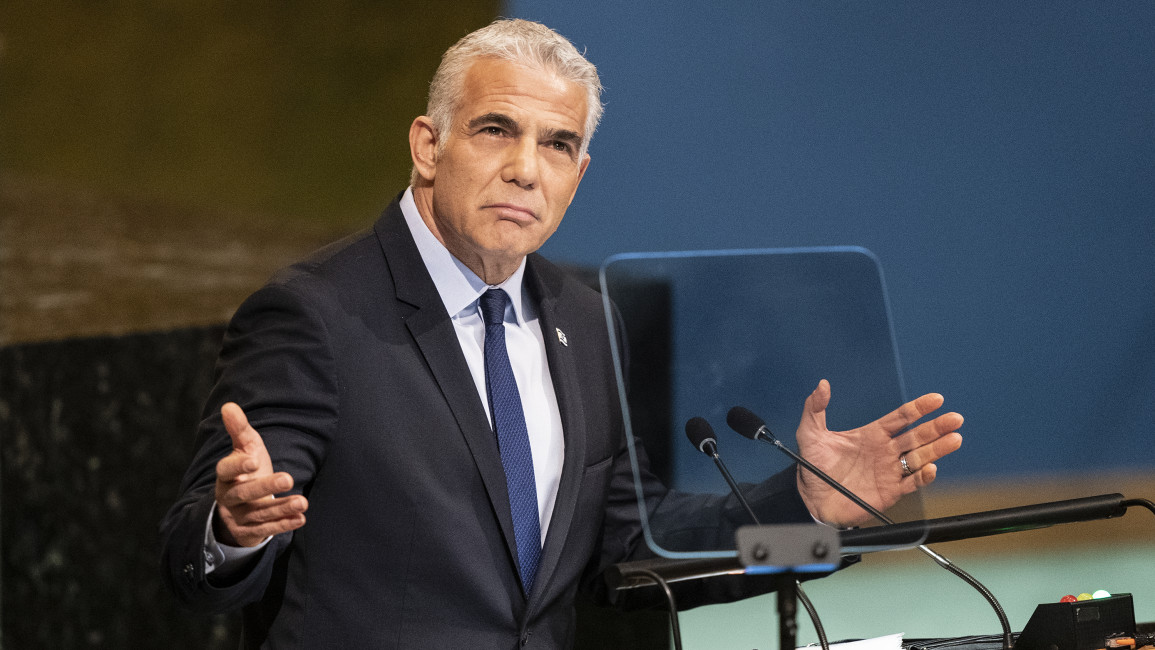Israel's Lapid accuses Netanyahu of 'aiding Hezbollah' over Lebanon maritime deal criticism
Israel Prime Minister Yair Lapid accused former premier and current opposition leader Benjamin Netanyahu of aiding Hezbollah's propaganda efforts, after criticising a potential maritime deal demarcating Lebanon's border.
Lebanon will send its comments on a US proposal to agree on its maritime border with longtime foe Israel to the American official mediating talks by Tuesday, a top Lebanese official has said, to allow for the exploration of gas fields.
US envoy Amos Hochstein has shuttled between Lebanon and Israel since 2020 to seal a deal that would pave the way for offshore energy exploration and defuse a potential source of conflict between Israel and Iran-backed Lebanese group Hezbollah.
Though full details of the agreement have not been made public, it was greeted positively by Israeli and Lebanese officials with even Hezbollah softening its staunch opposition to the deal.
"I understand that it pains you that you didn’t succeed in achieving an agreement [when you were prime minister], but that is no reason to join [Hassan] Nasrallah's propaganda campaign," Lapid tweeted on Monday.
He added that Netanyahu hasn’t seen the agreement and that it grants Israel "100% of its security needs, 100% of the Karish reserve, and even some of the profits from the Lebanon reserve".
קצת עובדות לנתניהו, פשוט כי הוא לא ראה את ההסכם: ישראל מקבלת 100% מצרכי הבטחון שלה, 100% ממאגר כריש ואפילו חלק מהרווחים של המאגר הלבנוני. אני מבין שכואב לכם שלא הצלחתם להשיג הסכם כזה, אבל זו לא סיבה להתגייס לתעמולה של נסראללה. אפשר לפרגן קצת לממשלה שעובדת ומביאה תוצאות לעם ישראל.
— יאיר לפיד - Yair Lapid (@yairlapid) October 3, 2022
Hochstein sent a written draft proposal to Beirut last week. It was discussed on Monday by President Michel Aoun, Prime Minister Najib Mikati, and parliament speaker Nabih Berri.
The three would pull together their concerns on the draft to send it to Hochstein within 24 hours. They would not respond officially to the proposals until their queries were addressed, said Elias Bou Saab, Berri's deputy and the main pointperson for the file in Lebanon.
"The devils are in the details, but the devils are now small," said Bou Saab, speaking to journalists after the top officials met.
The 10-page draft appears to float an arrangement whereby gas would be produced by a company under a Lebanese licence in the disputed Qana prospect, with Israel receiving a share of revenues.
Few other details have been made public, but Bou Saab said on Monday that the arrangement secures all of Lebanon's rights in relation to Qana and Mikati said that the draft included "all essential matters".
Bou Saab said he expected a response by Hochstein by the end of the week, and only then could Lebanon prepare an official response.
Israel has said its own legal experts are also reviewing the draft before it can be approved.
Israeli media reported that the cabinet will meet on Thursday to approve the deal, but no session is formally scheduled.
A senior Israeli official told Reuters that it was not yet clear when the government would take that step, as it awaited word of Lebanon's response.
"If they come back with changes - other than small, technical things - it may not be done by Thursday," the official said.
A top Lebanese source briefed on the negotiations said that if an agreement is reached, it would come into force via a ceremony in the southern Lebanese border town of Naqoura.
The mechanisms are not clear, but Aoun said there would be "no partnership" with the Israeli side.
While the company carrying out the exploration in Qana has been officially named, Lebanese officials have publicly suggested a role for TotalEnergies SE and a top Israeli official was meeting company representatives in Paris on Monday, according to a source briefed on the matter.
Israel's energy ministry confirmed that its director-general Lior Schillat, who also heads Israel's negotiating team, was in Paris for discussions on Monday.
TotalEnergies declined to comment.
(Reuters contributed to this report)



